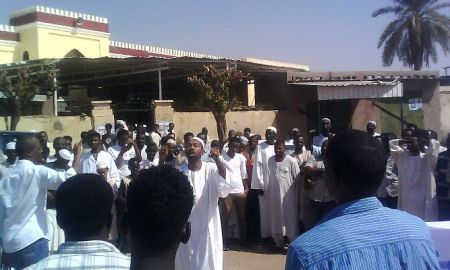Sudanese opposition calls for public mobilization to resist price increase
November 4, 2016 (KHARTOUM) – Sudanese opposition has rejected the government decision to raise fuel and electricity prices and called for resisting it by all civil means.

Accordingly, the price of gasoline went up to 6.17 pounds per litre, (27.5 per gallon) while the litre of diesel reached 4.11 pounds (18.8 pounds per gallon).
Also, electricity tariff for consumers of more than 400 kilowatts has increased, in order to not affect low-income households who are classified as low energy users.
The move, which took effect at midnight local time on Thursday, comes as part of a series of austerity measures to reduce the trade deficit following the collapse of oil prices and as the economy of east African country is already affected by the U.S. economic sanctions.
The opposition National Umma Party (NUP) on Friday has declared the “civil Jihad” to resist the price increase, calling on the Sudanese people to organize general protests, strikes and sit-ins.
“We would resist these unjust policies by all means of civil Jihad”, said the NUP in a statement extended to Sudan Tribune on Friday.
It pointed out that the country’s crises could only be overcome by establishing a new regime, describing the government decision to raise fuel and electricity prices as a “declaration of war against the citizens”.
The statement called for unifying efforts to overthrow the regime, saying the raised police preparedness level to 100 percent in concurrent with the declaration of the austerity measures in order to violently repress protests as occurred in 2013.
In September 2013 following the government’s decision to lift fuel subsidies, demonstrations broke out in several Sudanese states. Rights groups said that at least 200 people were killed but the government put the death toll at 85.
NUP further described the government economic policies as unjust, failed and blundering, calling for holding a genuine national economic conference to develop alternative policies.
It added that the economic problem would only be resolved within a wider framework that addresses the entire Sudanese crises, describing the regime as bloody, corrupt and failed.
For its part, the Sudanese Congress Party (SCoP) has called on the Sudanese people to take to streets to protest against the price increase and to change the regime.
In a statement extended to Sudan Tribune on Friday, SCoP said the Sudanese has no option but to build momentum to achieve change and overcome the troubled reality.
It added that the government policies would only further poverty and suffering of the Sudanese people, calling for public mobilization to confront the corrupt regime and its flabby security organs and political apparatus.
The statement pointed that deteriorating economic situation is a natural consequence of the lack of strategic and scientific planning; saying government policies are only driven by unruly lust for wealth and power.
Meanwhile, the Arab Ba’ath Party (ABP) on Friday said the National Intelligence and Security Services (NISS) has arrested its member Akram Abdel-Wahab and took him to an unknown destination.
In a statement extended to Sudan Tribune Friday, ABP said Abdel-Wahab was arrested for distributing leaflets denouncing regime policies.
Sudan has been reclassified by the IMF in 2012 from a net exporter to a net importer after the oil-rich south became an independent state, taking with it 75% of the petroleum reserves that existed in the united Sudan.
Price of the US dollar witnessed significant increase in the black market in Khartoum since last April settling at 16, 00 pounds (SDG).
(ST)
